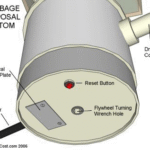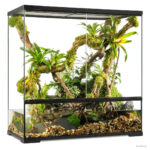Imagine coming home after a long day, only to find your living space invaded by pesky gnats. These tiny insects seem to appear out of nowhere, buzzing around your kitchen and living room, turning your sanctuary into a swarming nightmare.
You might wonder why your house is suddenly full of gnats and, more importantly, how to get rid of them for good. You’re not alone in this struggle, and there’s a good reason these unwelcome guests are drawn to your home.
Understanding the root cause of their invasion is the first step to reclaiming your space. As you read on, you’ll discover effective solutions that will not only help you eliminate these nuisances but also prevent them from returning. This article is your guide to diagnosing the problem, tackling it head-on, and ensuring your home remains gnat-free. You deserve a peaceful environment, free from these bothersome bugs, and we’re here to help you achieve just that. So, let’s dive in and uncover the secrets to getting your home back under control.

Credit: hereshegrows.com
Causes Of Gnat Infestations
Gnat infestations can be frustrating for homeowners. These tiny pests seem to appear out of nowhere and quickly multiply. Understanding the causes of gnat infestations is the first step to getting rid of them.
Common Attractants
Gnats are drawn to certain household items. Damp areas attract them. Leaving wet dishes in the sink can invite gnats. Overripe fruits are a magnet for these pests. They love sugary smells, so uncovered sweets can also attract them. Trash bins are another hotspot. Gnats are often found around food waste. Keep trash bins clean and covered to prevent infestation. Houseplants can also be a source. The moist soil is perfect for gnats to lay eggs.
Environmental Factors
Weather plays a big role in gnat presence. Warm, humid conditions are ideal for gnats. They thrive in moist environments. Homes near bodies of water may face higher gnat numbers. Stagnant water is a breeding ground. Check for water leaks around your home. Fix any damp areas immediately. Indoor humidity can also increase gnat activity. Use a dehumidifier to keep humidity levels low. Poor ventilation can make matters worse. Ensure proper airflow to reduce moisture.

Credit: healthyhomecleaning.com
Types Of Gnats In Homes
Gnats in homes include fruit flies, fungus gnats, and drain flies. These pests thrive in moist environments and decaying organic matter. To eliminate them, clean drains regularly, remove overripe fruits, and fix leaks.
If you’ve ever found yourself swatting at tiny, persistent gnats buzzing around your home, you’re not alone. These pesky invaders can be a real nuisance, often appearing out of nowhere and making you wonder why they’re there in the first place. Understanding the different types of gnats that might be invading your space can be the first step in reclaiming your peace. Let’s dive into the common types of gnats you might encounter in your home and how to deal with them effectively.Fungus Gnats
Fungus gnats are small, mosquito-like insects that are often found near houseplants. They thrive in moist soil and feed on fungi, which can develop when you overwater your plants. Have you noticed these gnats hovering around your beloved indoor greenery? It’s time to check your watering habits and ensure the soil isn’t too soggy. Consider letting the top inch of soil dry out before watering again. You might also use sticky traps to catch them or introduce beneficial nematodes to target their larvae.Fruit Flies
Fruit flies are notorious for their love of ripe or decaying produce. They are most commonly found in kitchens or anywhere fruits and vegetables are stored. Did you leave that banana on the counter a bit too long? These flies can multiply rapidly if given the chance. To reduce their presence, store your fruits in the fridge and clean up any spills immediately. You can also set up simple traps using apple cider vinegar and dish soap to lure and drown them.Drain Flies
Drain flies, or sewer gnats, are often found near sinks, tubs, or any location with standing water. They breed in moist environments, particularly those with organic matter. Ever notice them lingering around your bathroom or kitchen sink? It might be time for a deep clean. Scrub your drains with a stiff brush and flush them with boiling water or a mixture of baking soda and vinegar. Regular cleaning will help keep these gnats at bay and ensure your drains are free from organic buildup. By identifying which type of gnat is invading your home, you can take targeted action to eradicate them. Have you ever tried any of these methods? Let us know your experiences and tips for dealing with these unwelcome guests.Preventing Gnat Infestations
Gnats often swarm homes due to moisture, food scraps, or houseplants. To eliminate them, keep areas dry, dispose of overripe fruits, and maintain plant soil. Regular cleaning and proper waste management can significantly reduce their presence.
Preventing gnat infestations in your home is more straightforward than you might think. Gnats, those pesky little insects, often make their way into our living spaces due to certain environmental factors that we might overlook. By making a few simple changes in your daily routine, you can effectively keep these unwelcome guests at bay. Let’s dive into practical ways to maintain a gnat-free home.Proper Food Storage
Gnats are attracted to food, especially fruits and vegetables. Make sure to store these items in airtight containers or refrigerate them. Leaving food out can become an open invitation for gnats. Check your pantry regularly for any spills or leaks. Clean them immediately to prevent gnats from finding a food source. A clean kitchen is a first step towards a gnat-free home.Maintaining Clean Drains
Drains are another popular hangout spot for gnats. They thrive in moist environments, and a dirty drain provides just that. Pour boiling water down your drains once a week to clear any debris and deter gnats. Consider using a mixture of baking soda and vinegar. Pour half a cup of baking soda followed by half a cup of vinegar down the drain. Let it sit for a few minutes, then rinse with boiling water. This not only cleans your drains but also prevents gnats.Indoor Plant Care
Indoor plants can be a gnat magnet if not cared for properly. Overwatering plants can create the perfect breeding ground for these insects. Water your plants only when necessary and ensure pots have proper drainage. Inspect the soil regularly for any signs of gnats. If you notice any, allow the soil to dry out completely before watering again. This breaks the lifecycle of the gnats and helps eliminate them. Have you ever thought about how your daily habits might be inviting gnats into your home? By being proactive and making a few small adjustments, you can keep your space gnat-free and more enjoyable. Remember, prevention is always better than dealing with an infestation.
Credit: www.accuweather.com
Natural Gnat Elimination Methods
Gnats often invade homes due to moisture and food sources. Remove standing water and clean surfaces regularly to deter them. Use vinegar traps and essential oils to naturally reduce their numbers.
Natural methods can effectively eliminate gnats from your house. They are safe and eco-friendly. This approach helps in avoiding harsh chemicals. Let’s dive into some easy solutions.Homemade Traps
Create simple traps using common items. Use a jar, some sugar, and water. Mix sugar and water in the jar. Cover it with plastic wrap. Poke small holes in the wrap. Gnats enter, but can’t escape. This trap is effective and cheap.Essential Oils
Essential oils repel gnats naturally. Use oils like peppermint or tea tree. Mix a few drops with water. Spray it in gnat-prone areas. The smell keeps gnats away. Refresh the spray often for best results.Vinegar Solutions
Vinegar attracts and traps gnats. Mix apple cider vinegar with water. Add a drop of dish soap. The soap breaks surface tension. Gnats drown when they land. Use a bowl for this solution. Place it where gnats gather. Replace every few days to maintain effectiveness.Chemical Solutions For Gnat Control
Are gnats turning your living space into their cozy haven? If you’re tired of these pesky little insects buzzing around, it’s time to consider chemical solutions for gnat control. While natural remedies can be effective, sometimes you need a more powerful approach. Let’s dive into some chemical options that can help you reclaim your home.
Insecticidal Sprays
Insecticidal sprays are a popular choice for tackling gnats. They work by directly killing the insects on contact. You simply spray them in areas where gnats are most active, like around windows, plants, and trash cans. Make sure to choose a spray specifically designed for gnats to ensure effectiveness.
Have you ever noticed gnats swarming around your indoor plants? These sprays can be a game-changer. Just be cautious to follow the instructions carefully to avoid any harm to your plants or pets.
Foggers And Bombs
If you’re dealing with a severe gnat infestation, foggers and bombs might be your best bet. These devices release a mist that fills the room, targeting gnats in hard-to-reach places. They’re ideal for large spaces where other methods fall short.
Think of them as setting off a mini gnat apocalypse in your house. However, you’ll need to vacate the premises for a few hours during application. It’s also crucial to cover food and surfaces before activating a fogger to prevent contamination.
What’s your strategy for gnat control? Are you ready to try these chemical solutions, or do you have other tricks up your sleeve?
Long-term Gnat Management
Gnats can be quite the pesky invaders, buzzing around your home and disrupting your peace. While immediate solutions help, it’s crucial to think about long-term management to prevent these tiny nuisances from returning. Long-term strategies not only focus on eliminating existing gnats but also on stopping new ones from settling in your home.
Regular Home Inspections
Regular inspections of your home can be your first line of defense against gnats. Check areas where gnats thrive, like kitchen sinks, garbage disposals, and potted plants. Make it a habit to inspect these spots weekly.
Spotting problems early can save you from a massive infestation later. Think about it: wouldn’t you rather find one gnat than hundreds? Look for moisture build-up or decaying organic matter, as these are perfect breeding grounds.
Encourage everyone in your household to take part. Imagine making it a fun family activity where everyone gets to play detective. Not only does it increase vigilance, but it also makes the task less daunting.
Seasonal Precautions
Gnats are particularly active during warmer months. As seasons change, adapt your strategies to keep them at bay. In spring and summer, pay extra attention to outdoor activities that might attract gnats.
Consider setting up outdoor traps or using natural repellents. For instance, citronella candles can help during barbecues or garden parties. It’s about being proactive rather than reactive.
Fall and winter can be your allies in gnat management. Use these cooler months to deep clean and prepare your home for the upcoming gnat season. Think of it as a preemptive strike against future invasions.
How often do you think about the long-term impact of gnats on your home environment? By implementing regular inspections and seasonal precautions, you can maintain a gnat-free home year-round. Just imagine the relief of enjoying your space without the constant buzz and annoyance. Are you ready to take control?
Frequently Asked Questions
What Attracts Gnats Into My Home?
Gnats are drawn to moisture and decaying organic matter. They often enter through open windows or doors.
How Do I Identify Gnat Infestations?
Gnats are small, flying insects. You might notice them around plants, sinks, or trash.
What Are Natural Ways To Repel Gnats?
Use vinegar traps or essential oils like eucalyptus. Keep areas dry and clean to deter gnats.
Can Household Products Eliminate Gnats?
Yes, sprays and traps can help. Regular cleaning with vinegar also reduces gnat presence.
How Do I Prevent Gnats From Returning?
Seal entry points, fix leaks, and dispose of trash regularly. Keep plants healthy and dry.
Conclusion
Gnats can be annoying house guests. They love moisture and food scraps. Keep your house clean to discourage them. Fix any leaks and dry damp areas. Use traps or natural sprays to reduce their numbers. Regularly take out trash and clean drains.
These steps help create a gnat-free home. Stay consistent with your efforts. Over time, you’ll see fewer gnats. Enjoy a more comfortable living space without these pesky insects. Keeping gnats away requires patience and diligence. But it’s worth the effort for a peaceful home environment.





